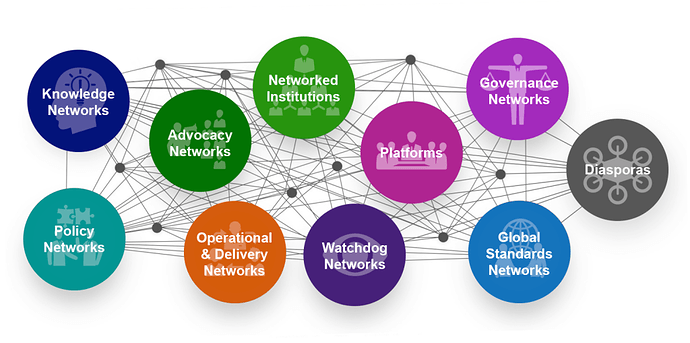Global issues related to poverty, health, energy, education, equality and the environment are so big and complex that it may seem at first that it would be impossible to manage. However, with artificial intelligence, some progress can be made in these areas. Here are some articles about how artificial intelligence has already helped in some of the before mentioned domains.
http://science.sciencemag.org/content/353/6301/790
With artificial intelligence, we get a lot of extra help to address these issues. Still, for now, it is not completely clear how efforts can be coordinated in such ways that these would lead to actual (somewhat) permanent solutions. Is it even possible you may wonder?
When solving global issues there are multiple stakeholders, as proposed by Dan Tapscott here, as you can see below:
Network Type |
Description |
Examples |
|---|---|---|
| Knowledge Networks | The primary function of Knowledge Networks is to develop new thinking, research, ideas and policies that can be helpful in solving global problems. Their emphasis is on the creation of new ideas, not their advocacy. | Stockholm International Peace Research Institute; Global Network for Women and Children’s Health Research, Wikipedia, TED. |
| Operational and Delivery Networks | This class of networks actually delivers the change it seeks, supplementing or even bypassing the efforts of traditional institutions. | Crisis Commons, Kiva, 350.org, The Standby Task Force, Digital Democracy, The Red Cross, World Wildlife Fund, Bill and Melinda Gates Foundation Global Health Program, Medicines for Malaria Venture, The Microcredit Summit Campaign |
| Policy Networks | Sometimes networks create government policy, even though they may consist of non-governmental players. Policy Networks may or may not be created or even encouraged by formal governments or government institutions. Some policy networks support policy development or create an alternative for policy. Policy networks also exist to create and encourage discussions on policy issues. | The Internet Governance Forum, International Competition Network, The PRI (Principles for Responsible Investment) |
| Advocacy Networks | Advocacy Networks seek to change the agenda or policies of governments, corporations or other institutions. | Avaaz.org, Keep a Child Alive, Conscious Capitalism (advocates to corporations). Hundreds of these networks are listed at World Advocacy.com. |
| Watchdog Networks | These networks scrutinize institutions to ensure they behave appropriately. Topics range from human rights, corruption, and the environment to financial services. | Human Rights Watch, The Environmental Working Group, Amnesty International, The Global Reporting Initiative |
| Platforms | Some networks seek to provide platforms for other networks to organize. | Ushahidi, Challenge Post, Change.org, seToolbelt, Code for America, thesojo.net |
| Global Standards Networks | Non-state based organizations that develop technical specifications and standards for virtually anything, including standards for the Internet itself. | Internet Engineering Task Force (IETF), World Wide Web Consortium |
| Governance Networks | These are multi-stakeholder networks and have achieved or been granted the right and responsibility of non-institutional global governance. | Internet Corporation for Assigned Names and Numbers, International Organization of Securities Commissions, Marine Stewardship Council, Forest Stewardship Council, The Kimberly Process Certification Scheme |
| Networked Institutions | Some networks provide such a wide range of capabilities they could be described as Networked Institutions. They are not state-based but rather true multi-stakeholder networks. The value they generate can range from knowledge generation, advocacy and policy development to actual delivery of solutions to global problems. | The World Economic Forum, The Clinton Global Initiative, The Global Water Partnership |
| Diasporas | Diasporas are global communities formed by people dispersed from their ancestral lands but who share a common culture and strong identity with their homeland. Thanks to the Internet these people and their affiliated organizations can now collaborate in multi-stakeholder networks. One of the functions of many of today’s diasporas is to address and help solve common, global problems. | OneVietnam Network, International Diaspora Engagement Alliance, African Idea Marketplace |
So when solving global challenges, one would need to navigate as a powerful group through multiple stakeholders before reaching some end goal. The stakeholders all have their own beliefs, desires, needs, and powers. Even when you think you found the cure that nobody can resist, you would be surprised…
However, societies are at the same time also perhaps growing towards alternative forms of organization. At miniscule scales perhaps you could say that some sort of decentralized societies are starting to emerge. Of course, these would also again create their own stakeholders and power structures - even if they are decentralized. As far as I know, there is no real taxonomy of how that would look like yet (and I don’t think it is possible to create yet either as it is still evolving).
Coming back to the point… artificial intelligence can help with a lot of these global challenges… but how do you push for change through multi-stakeholder networks for global problem solving? What are the right questions to ask regarding this topic? Which frameworks are important? How can we solve global challenges?
Obviously, this is a huge question with no straightforward answer. I am curious to hear your ideas, perspectives, and insights about this + feel free to share resources in this topic.


